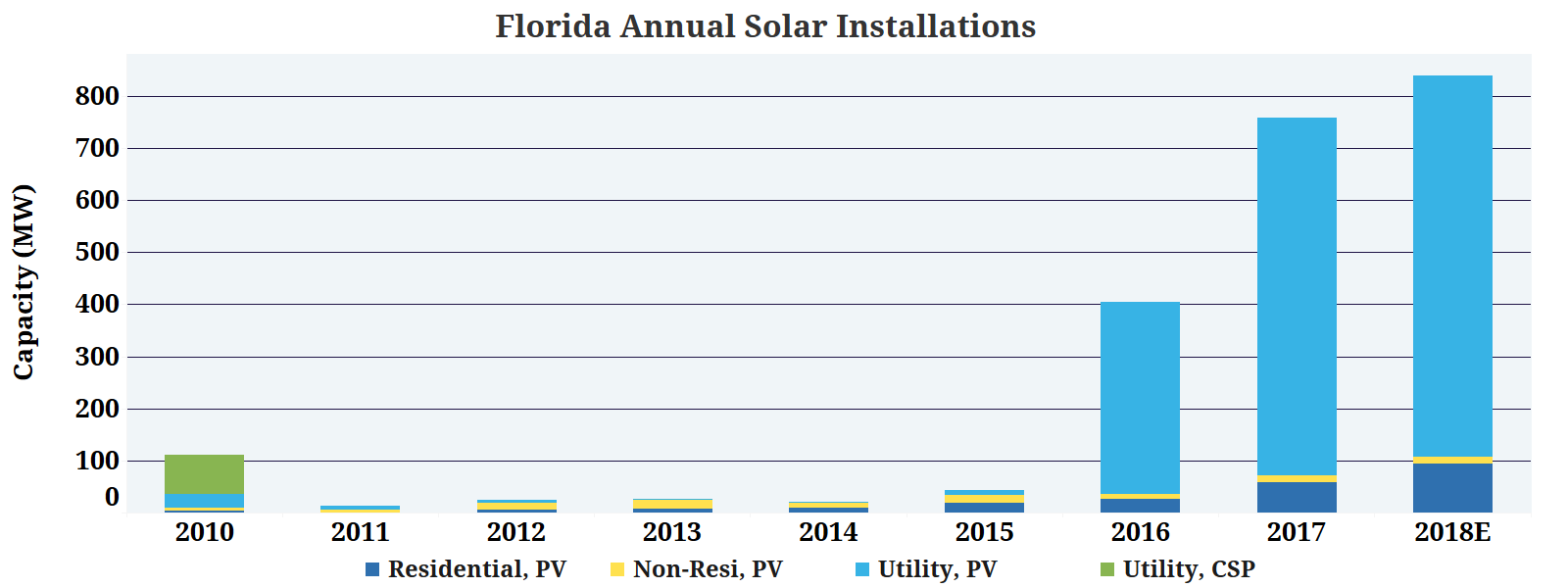Florida law states that anyone that sells electricity to end-users is a “public utility”, and thus must be governed by the complex set of rules that utilities have to follow. This has meant that power purchase agreements (PPAs) are illegal in Florida.
Starting in April of this year, the Florida Public Service Commission explicitly approved Sunrun’s solar lease contract – stating it wasn’t a sale of electricity, and that it also didn’t make Sunrun a public utility. We say “explicitly” because solar leases may have been legal, but the legal uncertainty kept the national companies away.
On January 3, 2019, Florida Senator Jose Javier Rodriguez filed SB 222: Private Property Rights that seeks to alter the language of Section 366.02 to add to the list of items the term public utility does not include:
34 ......a property owner 35 who owns and operates a renewable energy source device as 36 defined in s. 193.624 with a capacity of up to 2.5 megawatts on 37 his or her property and who produces and provides or sells 38 renewable energy from that device to users located on the 39 property;
The law’s wording seems to only allow for property owners to build and sell electricity to users on said real property. This will allow for building owners to sell electricity to those who occupy their structures, but it might not allow for a company like Sunrun, who will never own someone’s home, to sell electricity.
pv magazine has reached out to the Senator’s office for confirmation on this interpretation of the legislation.
Miami New Times reporter Jerry Iannelli quoted the Senator as giving a blunt reality check,
The big utilities use their political muscle to maintain outdated monopolies.
This political muscle was deployed in 2016 when an industry lobbyist was recorded saying that utilities should manipulate voters – using political jiu-jujitsu – into voting for a bill that would seemingly support solar power, but instead ceed important strategic rights to said utilities. Despite massive spending by utilities, the bill failed that session.
While the Sunshine State is definitely moving up the list in terms of volumes of solar power being deployed per SEIA data below, with projections suggesting the state will deploy the second most of any state over the next five years, currently the 3rd most populated US state is the 8th ranked state after being a national leader early on. And even though electricity utilities are dominating these deployments, small scale solar is also showing great growth from tiny deployment volumes.
This content is protected by copyright and may not be reused. If you want to cooperate with us and would like to reuse some of our content, please contact: editors@pv-magazine.com.








The part I would clarify is that a very large chunk of the PV capacity that’s been deployed in FL are large utility scale projects that were developed and are owned by Florida Power & Light/Next Era. Take those projects out of the mix and the deployment level drops drastically. That goes to back up the monopoly claim even more.
This has always been legal clearly in Florida from any reading of the law, leasing at a set rate/month instead of by kwh..
Not mentioned is any group can start a co-op as long as everyone owns a part of it.
PPAs are legal, just to utilities, co-ops, microgrids.
Anyone can start a utility, microgrid, etc here in Florida. And what Sunrun, etc should do.
But leasing is a dying business model as most buy now anyway. Leasing will always cost more is why and the unknown of solar is no longer unknown, thus risk that leasing assumes is no longer needed.
They did make it legal to sell power for charging EVs 2 yrs ago or so.